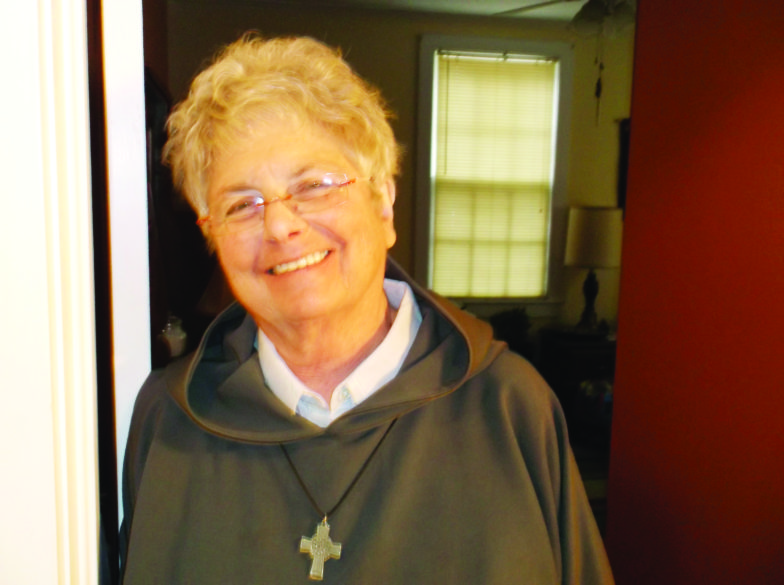
From the hermitage
By Sister alies therese
People “go to Mass” for a variety of reasons. Some go because they are compelled by some notion of obligation or see the community value in it. Others are afraid of committing a mortal sin by not attending. Some understand and respect the transubstantiation process. And others, indeed, who like the preaching or music.
Perhaps you have a few additional thoughts on what you consider “go to Mass” means, or as it has been said “hear Mass.” We know about the Lord’s Supper or Holy Communion. Excellent preaching is rarely found and music can vary from one place to another, full-blown Cathedral choirs to small mission church pianists, all trying their best to assist us in our worship.
In my almost 50 years, I have been many places in one form of ministry or another and there’s not much I haven’t seen or heard. I suppose we have our favorite niggle … one of mine is singing all the verses (most of the time).
Music and art are very important to the reverential and special way that liturgy might be celebrated. In particular, music knits the Mass parts together, gives a flow to the delicacy of the Eucharist and gives us, the worshippers, the opportunity to sing out our praise to God and to be reminded of an important part of the story.
If you consider some of the hymns you might favor you might leave out verses three and four, for example. This seriously diminishes the fullness of the text that the author was so inspired to write.
Here are two examples …
The highlights of the verses of “Softly & Tenderly,” published by Will Thompson in 1880, are rooted in Matthew 11:28. For me the whole point of the hymn is in verse four, “Oh, for the wonderful love.”
(1) Softly and tenderly Jesus is calling/ … see on the portals He’s waiting and watching
(2) Why should we tarry when Jesus is pleading/ …Why should we linger and heed not His mercies?
(3) Time is now fleeting, the moments are passing/ … shadows are gathering, deathbeds are coming …
(4) Oh, for the wonderful love He has promised/ …Though we have sinned, He has mercy and pardon …
Another example is “Alleluia! Alleluia! Let the Holy Anthem Rise,” by Edward Caswall (1841-1878).
(1) Alleluia! Alleluia! Let the holy anthem rise …
(2) … Like the sun from out the wave …
(3) … Christ has burst our prison bars …
(4) … Blessed Jesus, make us rise …
As in any well-written piece, the author of the text wants us to travel somewhere with our musical storytelling so that the lessons we need to learn about the truths of faith might be presented in a robust and satisfying way. In this case, the author wants us to go from our attempt at understanding that Jesus was raised from the dead, how powerful that was and what it might look like, in order to get us to the final verse where we now ask … “make us rise.” From what God has done to what we need. From what God has done to what God now promises us. When we cut off the latter two verses, we almost miss the point Caswall was making.
You might think this is a bit petty. I’ve heard others complain it makes the “Mass too long” to sing all the verses. OK. But it is really only once a week (minimum). For me, if we are going to include music in the liturgical celebrations then we need to have great respect for both text and music.
There is a lot of energy used in singing and there are so many hymns and parts to choose from. We have seen over the years the changes in style, some coming back, some fading out. What we might need to be reminded of is that in the very act of singing, or with other forms of musical accompaniment, are at least two things: 1) that the community is inspired to cooperate with the Spirit to praise God and 2) that our worship of God is serious enough to be careful about our art and music so that as we leave our celebration, we are indeed prepared to welcome the stranger, the neighbor, the other because the message of a hymn sings sweetly in our hearts.
It is not necessary to sing every verse all the time, as it is not necessary to sing all the Mass parts (especially if the presider feels a bit challenged). However, when the liturgy team chooses for us what best expresses the liturgy and prayer of the day, we might consider more carefully how we participate with abandon and joy so that our God might be joyously worshipped and praised.
(Sister alies therese is a vowed Catholic solitary who lives an eremitical life. Her days are formed around prayer, art and writing. She lives and writes in Mississippi.)
